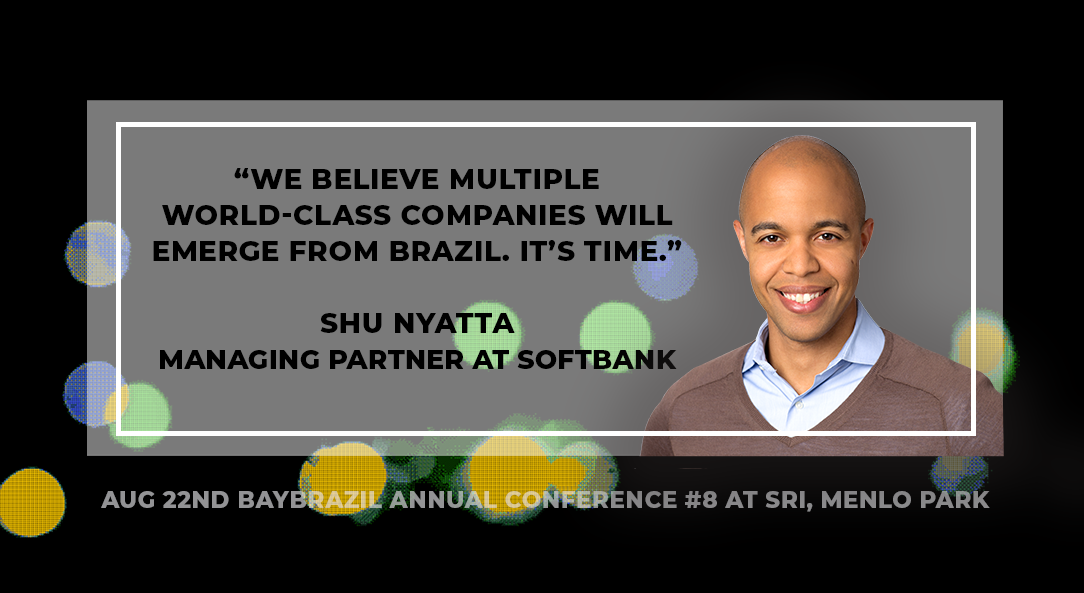Shu Nyatta is co-leading SoftBank’s new $5B Latin America-focused technology growth fund.
He will be a featured speaker at BayBrazil annual conference on August 22nd at SRI International in Menlo Park.
In our conversation this week, Shu talks about what is driving the record investment growth in Latin America, the factors that differentiate Brazil from other emerging countries and a trend that is impacting the largest cities around the globe.
There are still some tickets available to join us for BayBrazil’s 8th annual conference here.
BayBrazil: Venture funding is Latin America is way up from previous years. Recent data shows that VC funding has quadrupled since 2016 to a record US$ in 2018. What’s driving this tremendous investment growth?
Shu: You should expect this trend to continue, and obviously we are playing a big role in driving more capital into the region. I can’t speak for others, but the reason we’re excited is quite simple: there are great entrepreneurs in Latin America building really interesting businesses addressing large portions of the economy, but they have been severely starved for capital. We believe we can provide the capital and expertise to unleash these entrepreneurs and help them build very valuable, globally admired companies.
BayBrazil: Fintech has been a booming sector, particularly in Brazil, for the last several years. Which specific tech sectors are you most bullish on now and why? Do you see another disruptive breakout sector for 2019 such as healthtech in Brazil?
Shu: It’s hard to speak strictly in terms of sectors, because in emerging markets that have been significantly under-served by incumbents opportunities tend to blur together. For example, is Rappi a food company, a logistics company or a payments company? Rather than think only in terms of sectors, we like to think of the secular trends that are driving change, and find companies that are accelerating and benefitting from these powerful secular trends, using technology. For example, urbanization and the re-imagining of urban life and infrastructure – how people eat, move, live, work. This is a trend affecting the biggest cities in the world, including Sao Paulo, Rio, Mexico City. Several SoftBank companies including Uber, DiDi, Rappi, OYO, WeWork, Loggi are all riding this trend. My prediction for 2019 and 2020 is inclusion – large portions of the population have been left out of the formal economy, and technology will bring those people into the economy in powerful and profitable ways.
BayBrazil: How would you compare and contrast Brazil with other emerging countries?
Shu: Brazil is a powerhouse. There’s talent, scale, a real consumer base, favorable government policy, and economic momentum . That’s a really rare combination, hard to find anywhere in the world. There have been severe economic and political cycles in Brazil and the rest of the region, but we are long-term thinkers and couldn’t be more confident about the country’s prospects. We believe multiple world-class companies will emerge from Brazil. It’s time.
BayBrazil: Founding and growing a startup company can be a difficult job. Please share your advice for entrepreneurs leading early-stage startups and what they need to keep in mind.
Shu: Building a successful company from scratch is incredibly tough. We are humbled by entrepreneurs, and see our job as making their journey easier by being a true, long-term partner and helping them to think big. However, it’s important to “think big, but act small” – every successful startup started by solving a very real and very specific problem, and doing so in a very focused, customer-centric way. Only then do you earn the ability to “think big”. Remember, Amazon used to be a really good bookseller.
Hear more from Shu in our conference on Aug 22nd when he’ll seat down for a chat with Jose Berenguer, Country Officer for Brazil at JP Morgan.








